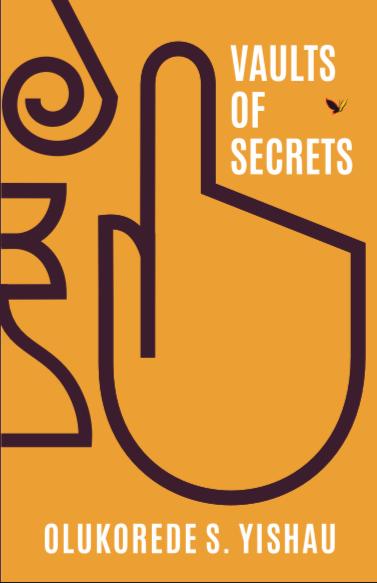BY EDWARD DIBIANA
From October 1st, 2020, Nigeria’s 60th Independence anniversary, Nigerians and the rest of the world will have access to Olukorede S. Yishau’s new book ‘Vaults of Secrets’, a buffet of relatable stories, etched in vivid imageries, not necessarily to entertain, yet enthralling. It’s a critical work with a number of themes that underscore diverse social ills, with an unpretentious objective to admonish against dark tendencies; and also, awaken the consciousness of the reader, nay society to the legion of maggots of evil, avarice and amorality, seemingly crawling out from the cesspit of societal value depravity. And feasting on human frailties, leaving on its trails, mangled destinies, and mutilated integrity.
Yishau, in this collection of short stories – his second literally outing – after his very successful ‘In the Name of Our father’, a novel, reinforces his emerging profile as a social crusader, determined to continue to uphold the banners of good values, propriety and uplift of humanity.
His new book, in a subtle but impactful narrative, graphically addresses topical societal problems such as rape, infidelity, domestic violence, mental health issues, corruption, human trafficking, drug trafficking, sex slavery, institutional decay, labour issues, among other themes.
The book, indeed, is a trove of secrets. Dark. Dreadful. Sordid. Seedy. Soulless. And some, very abominable, like the conspiracy of silence by a family to cover up an incest between a father and a daughter, that produced an unfortunate son, who was to learn, sadly, by chance, that his depraved grandfather, was also his father. And his mother, his sister, as well. In this third story in the collection, titled, “My Mother’s Father is My Father”, a twisted character, Ababio, lacking in morals and expected good parental values, described in the book as “father-grandfather”, raped and impregnated his teenage only child.
Advertisement
Williams, the product of the unholy act, who is also the protagonist in the story, on discovering the seedy secret behind his parentage, summed up his situation thus: “What my mother could not tell me was that her father is my father; that she is my mother and sister…” Page 27.
That sordid secret apparently overshadowed Ababio’s entire family with a cloud of depressing darkness, that ultimately led to his sad death and that of his wife. The emptiness and burden left behind by that haunting secret, didn’t spear the victim daughter, Evelyn, either. She disappeared to the unknown. Although redemption came the way of the eternally disturbed product of the incest through the benevolence of a man who later gave his life a new meaning, by taking him abroad, where he received education, his life, like a living nightmare, was continually haunted by the circumstances of his birth.
‘Vaults of Secrets’, a collection of ten short stories, opens with a sad tragic story, titled “Till We Meet To Part No More”. The story, though depressing, is replete with bitter life lessons of consequences of uncontrolled anger, domestic violence, inhumanity and alcoholism. It also plays up the possibility of a dwindling economic or financial stability, impacting adversely on people’s mental health and marriage stability.
In this very disturbing story, the author deployed both first and second person narrative technique in serving this tragic tale of two condemned female prisoners, Elizabeth and Oluwakemi. Both were imprisoned for murder. None had the benevolence of redemption. They were visited with justice- whether deserving or harsh. Their fates seemingly threw them in a whirlwind of events that sucked them irretrievably into a web of darkness, propelled by anger and perhaps, poor judgment, where they groan in anguish and regret.
Advertisement
The joy and the blossoming romantic story of Oluwakemi and her husband Jide were cruelly terminated when domestic violence crept into their marriage. Both met in Queens, New York, in America, returned to Nigeria full of hope to start a family. Hard times didn’t only hit Jide, it changed him from a loving husband to a violent alcoholic beast. One day, Oluwakemi, the sad victim of domestic violence, decided to fight back to defend herself, and Jide was killed in the process. And her life went from bad to worse. She died a lonely painful death through cancer while waiting for her execution in the prison.
Her sad story was captured thus: “The trial did not take long because I confessed to killing him in self-defense. The judge found me guilty of first-degree murder, his family accused me of killing their son – they said it was premeditated. Nobody mentioned the fact that I had been abused, or that I had been his punching bag, and they had known about it. Here I am, awaiting death. I have been awaiting for 15 years, and each day is like a torture to me.” Page 7.
And her regrets: “There is something that silence does for a condemned person. It makes you contemplate things – you think about all the paths that your life could have taken. I could have been happy; I could have been successful. Maybe I could have been famous.” Page 7.
The story revealed that she chose to stay in the abusive marriage that led to her tortuous end because of her children, who eventually distanced themselves from her after she was condemned. By highlighting that, perhaps the author is seemingly querying the sense in enduring an abusive marriage because of children as many people in African society are often encouraged to do.
Her story, before meeting Jide, was not less unpleasant. Born to a roguish father, who together with her mother, sold her into slavery at 14, to Madam Koikoi who promised to give her a better life in America. She rather endured a mangled childhood in America, fragmented by ugly experiences of deprivation of liberty, lack of parental love and care, exposure to pornography as a minor, child abuse, denial of formal education, rape, sex slavery, psychological and emotional torture.
Elizabeth, the other condemned prisoner in the story, had also welcomed a possibility of death through leukemia, which she was diagnosed with after the death of her friend and cell mate, Oluwakemi.
Advertisement
In this collection, Yishau has not only exhibited the experienced journalist in him, by paying attention to details in his narrative, he has also proven his mastery of the intricate art of storytelling. He tells stories with stories and weaves them into a confluence of tales that flow seamlessly in a labyrinth of plots, that holds the reader captive and effortlessly pulls him fluidly along in the enthralling narrative. His use of short sentences makes his narrative easy to follow; and the messages sharp and clear.
In one breath, he brings alive the graphic picture of the anguish in a prison cell. Or lewd imagery of a man sweating it out under a gyrating maid, on his matrimonial bed. In another he is taking the reader on a tourism ride of the opulent cities of London in the United Kingdom or Maryland in the United States of America and their iconic centres. Yet on another instance, the reader is flipping the pages as the author takes him into the inner recesses of the popular billionaire playground in Lagos State, Banana Island and the obscene extravagant lifestyles of some of the characters like Nonso Ejiofor, who died in the middle of a threesome with the wife of the best friend of one of his employees and another girl, young enough to be his granddaughter, in the story, “This Special Gift”. Or the sight and sound of Calabar, in Cross River State. Yishau’s creative imagination is boundless.
The author also implores factual historical incidents and images to make his stories relatable.
For instance in page 30 in the story, “My Mother’s Father Is My Father “, he deploys that technique succinctly thus: ” The London I arrived in was where pensioners outside Margaret Thatcher’s home bore placards with inscriptions, such as ‘Give us back our fuel allowance’ and ‘Help the needy, not the greedy ‘. The Margaret Thatcher conservative government, which emerged in 1979, was letting go of government-run industries which the Tories felt were costing more to run.”
He also never fails to apply poetic justice in this collection. Serving justice appears to give him some kind of satisfaction. Most of the antagonists in the book were visited with unpleasant ends. Somehow, in a curious,cold and uncanny meanness, he devices a means to kill them all!
The stories, in this collection, are all fascinating and a reader’s delight. I recommend it to all lovers of good literary books. But certainly not young children, apparently on account of the salacious content in some of the stories.
Advertisement
Dibiana is a journalist, literary critic and creative writer.
Advertisement
Views expressed by contributors are strictly personal and not of TheCable.
Add a comment






